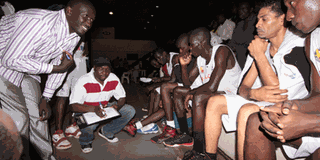The rise, fall and fall of ‘giant’ Falcons

When we were kings. Coaches Gad Eteu (L) and Tony Oluka (black cap) talk strategy with the team players during a time-out of the 2012 Fuba National Basketball League playoffs at Lugogo Indoor Stadium. PHOTO BY ISMAIL KEZAALA
What you need to know:
- Basketball. In 2000, Falcons became the first Ugandan club to win the East, Central and Southern Africa Club Championship. No other team came close until City Oilers did so last year at the Fiba Africa Zone V Club Championships.
On June 14, 2011, the casket bearing the remains of Falcons basketball club founder John Ssimbwa was lowered into a cemented grave in Kinoni, Masaka.
That day capped the end of an era for a man who many in the game termed as “a giant” at a time when basketball was only a communal sport.
Then, aged 33, Ssimbwa changed the face of the game when he started Falcons in 1998. The space was largely occupied by Power, Blue Jackets and Makerere.
His ambition was to build a successful club. Ssimbwa did something ‘uncouth’ by picking players from mainly Blue Jackets, the dominant side of the day.
Many berated him for weakening other teams in what was an infant league to whet his own appetite for success.
To achieve that dream, he gave everything. Ten years after formation, Falcons became the most successful club in Uganda – winning a record six national league titles.
The last of those titles came in 2007, coming from 2-0 down to beat Warriors 3-2 in the best-of-five final series.
Crucially, in 2000, Falcons became the first Ugandan club to win the East, Central and Southern Africa Club Championship.
No other team came close until City Oilers did so last year via a competition that’s now called the Fiba Africa Zone V Club Championships.
After losing his job at URA in 2009, Ssimbwa became a habitual borrower to keep the club afloat as narrated by his close friend David Kato at his funeral mass.
“He would spend his last coin on his team even failing to build a residential house in Kampala,” Kato said six years ago.
Turning point
At his funeral, you sensed the inevitable: Falcons were never going to be the same again. The future was as hazy as driving through morning fog.
“He was a giant. We stood on his shoulders to achieve as a club,” Slyvan Kaboha, who worked with Ssimbwa at Falcons, told mourners.
“He was a philanthropist, very generous with money for his big family that is Falcons.” The most certain thing was that Falcons was bound to struggle.
Denis Mbidde, who had worked closely with Ssimbwa, took over Falcons as president and saved the side from extinction.
In the short term, Mbidde kept Falcons competitive amid enormous challenges but clearly lacked the funds to keep their best players.
Even before Ssimbwa’s death, the signs of a side in decline were ominous. Before the start of the 2010 playoffs, Mike Buzangu, Bienvenu Ngandu, Karim Nkusi, Didier Gahorani and Albert Lukunja left the club over unpaid dues.
The Malinga brothers; Henry and Eric, the bedrocks upon which the club was built had left for Warriors on the eve of the league tip off.
The surgery was lethal; Falcons fell behind Warriors and Power as the premier club. The latter pair contested the finals in 2009, 2010 and 2011.
However, at no point was relegation even comprehensible for Falcons.
Final kick
Mbidde, one of the better sports marketers in this country, managed to find sponsorship from Pepsi and later Startimes among others.
With that Falcons were able to keep Stephen Omony, one of Ssimbwa’s most treasured players. They also added Philip Ameny, Geoff Omondi and Abdullahi Ramadhan.
The side started to compete again, reaching the finals in 2012 and 2013, losing to Warriors and then-debutants City Oilers respectively.
“We want to win it for Ssimbwa” was a loud saying within the team then coached by Gad Eteu, one of those who benefited directly from working with him.
The dream was never achieved and Falcons degenerated further with city lawyer Robert Kagoro assuming the leadership from Mbidde in unclear circumstances.
There were clear signs of a thinning elephant as Oilers had raised the bar too high and Falcons couldn’t beat the semi final hurdle any more.
Inevitable
“The era we are into as sports is going to be very hard for clubs with clear ownership structures,” Mbidde, who stepped away from Falcons earlier this year, advised.
Indeed, Mbidde and Kagoro haven’t been in the management of the club as it slid into the abyss of relegation.
UPDF Tomahawks ensured the end of Falcons as a giant with a 70-66 victory at YMCA court on Monday night. They won only five of their 22 regular season games!
For many who have lived this game for the past 20 years, it hurts. However, the lesson Mbidde shares about ownership is important.
Also, the inexistent structure at many clubs and dependency on an individual makes clubs here unsustainable and far from durable.
Come to think of cricket’s Destroyers Cricket Club and football’s Victoria University, you get the feeling that while Falcons’ problems were inevitable after Ssimbwa’s death, it’s not the last.
Division One basketball in 2018 is a minor thing to deal with, for now. Fear for the worst.




